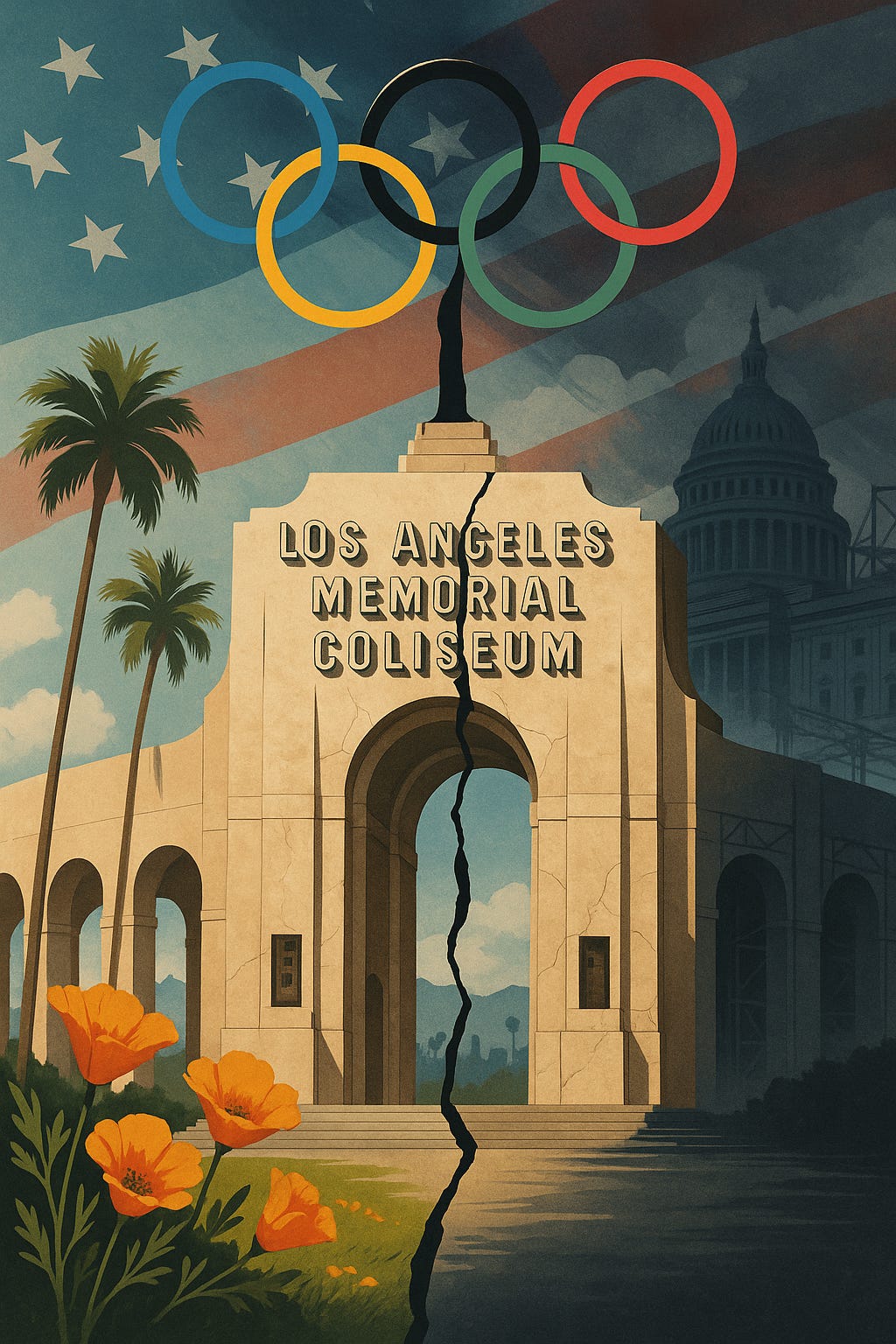Home Field Disadvantage?
How the 2028 Olympics are a Test of Municipal Diplomacy
In the summer of 2028, as athletes from around the world converge on Los Angeles for the third time in the city's history, they will arrive not merely at an Olympic Games but at the epicenter of a political experiment without precedent. The scene awaiting them is a liberal metropolis hosting a global celebration of unity while its mayor stands in federal court, suing the very agencies tasked with Olympic security. The spectacle will unfold against a backdrop that would have seemed fantastical even a few years ago, a city welcoming the world while fighting its own government.
Los Angeles has always been a city that believes in its own mythology, but the upcoming Olympics represent something more complex than typical Angeleno grandiosity. They offer a case study in what happens when subnational diplomacy collides with national isolationism, when a city's values diverge so sharply from Washington's that hosting the world's premier international sporting event becomes an act of soft rebellion.
This is not the first time that Los Angeles has found itself at odds with the federal government during an Olympic year, though the current tensions make previous conflicts seem quaint by comparison. When the city first hosted the Games in 1932, President Herbert Hoover was so preoccupied with the Great Depression and the violent dispersal of the Bonus Army from the nation's capital that he declined to attend altogether. Instead, Vice President Charles Curtis performed the ceremonial duties while Los Angeles proceeded to stage what many consider the first recognizably modern Olympics. The absence of presidential attention proved liberating. Hollywood stepped into the void, with Douglas Fairbanks hosting Olympic dignitaries at his Beverly Hills mansion while others welcomed athletes to dine alongside movie stars.
The 1984 Games presented the opposite dynamic. Ronald Reagan, California's former governor and the era's most telegenic president, embraced the Los Angeles Olympics as an extension of his own political brand. The spectacle suited him perfectly: the man with the jetpack soaring into the Coliseum during the opening ceremony might as well have been Reagan himself, a symbol of American technological prowess and limitless optimism. Reagan attended nine Olympic events, focusing his attention on ceremonies and diplomatic receptions rather than athletic competitions. His interest lay not in the sport itself but in the stage it provided for projecting American values during the height of the Cold War.
The upcoming Games will sprawl across dozens of existing venues from Downtown to the beaches, with swimming at SoFi Stadium and track and field returning to the historic Coliseum. They echo the past but mark a break from it too, staging a drama that’s never quite unfolded on Olympic ground.. Mayor Karen Bass, a former congresswoman turned confrontational city executive, has spent the past year in increasingly direct confrontation with federal authorities. Bass, who once prided herself on working across the aisle in Washington, now finds herself literally standing between federal agents and her constituents in MacArthur Park, demanding that armed officers leave her city. She has joined lawsuits challenging immigration enforcement practices and physically confronted federal raids. Donald Trump has accused her of paying protesters to disrupt federal operations. The relationship has deteriorated to such an extent that some commentators have called for Los Angeles to cancel the Olympics entirely.
This raises a fascinating question about Olympic hosting in an era of American political fracture. The Games require extensive federal involvement, particularly in security, where agencies like the Secret Service and FBI take operational control. Yet these are precisely the institutions that Bass views as instruments of political persecution. The result is a situation without precedent in Olympic history: a host city that must simultaneously welcome the world while defending itself from its own federal government.
The irony is that Los Angeles may be uniquely positioned to navigate this contradiction. The city has long operated as a quasi-independent diplomatic entity, conducting business with international partners, setting climate goals, and projecting cultural influence that often supersedes federal policy. The 2028 Games' emphasis on sustainability and inclusivity represents a form of soft power that runs counter to the current administration's priorities, yet proceeds regardless of Washington's approval.
This independence reflects a broader shift in how American cities relate to global affairs. As the federal government has retreated from international cooperation, municipalities have stepped forward to fill the void. Los Angeles' rebellion manifests in concrete ways: sanctuary city policies that directly contradict federal enforcement priorities, plans for carbon-neutral Games that ignore federal environmental rollbacks, and Olympic venues being constructed partly by the undocumented workers federal agents are simultaneously hunting.
The historical precedent suggests this approach might actually enhance rather than diminish the Games' impact. The 1932 Olympics succeeded precisely because local leadership compensated for federal neglect. It created innovations, including the Olympic Village concept and standardized medal ceremonies, that shaped every subsequent Olympic Games.
Whether the 2028 Games will prove similarly transformative remains to be seen, but they test whether subnational diplomacy can stand in for national leadership. When the Olympic flame is lit in Los Angeles, it will illuminate more than a sporting spectacle. Athletes from nearly two hundred nations will be gathered in the same Coliseum where Reagan once basked in Cold War triumph, while federal agents patrol the perimeter of a city that has sued their agencies for constitutional violations. The flame will reveal whether the American experiment in federalism has evolved to the point where cities can conduct their own foreign policy, hosting the world even when their own government would prefer to keep it at arm's length. In that moment, the world may finally see what kind of country America wants to be.


